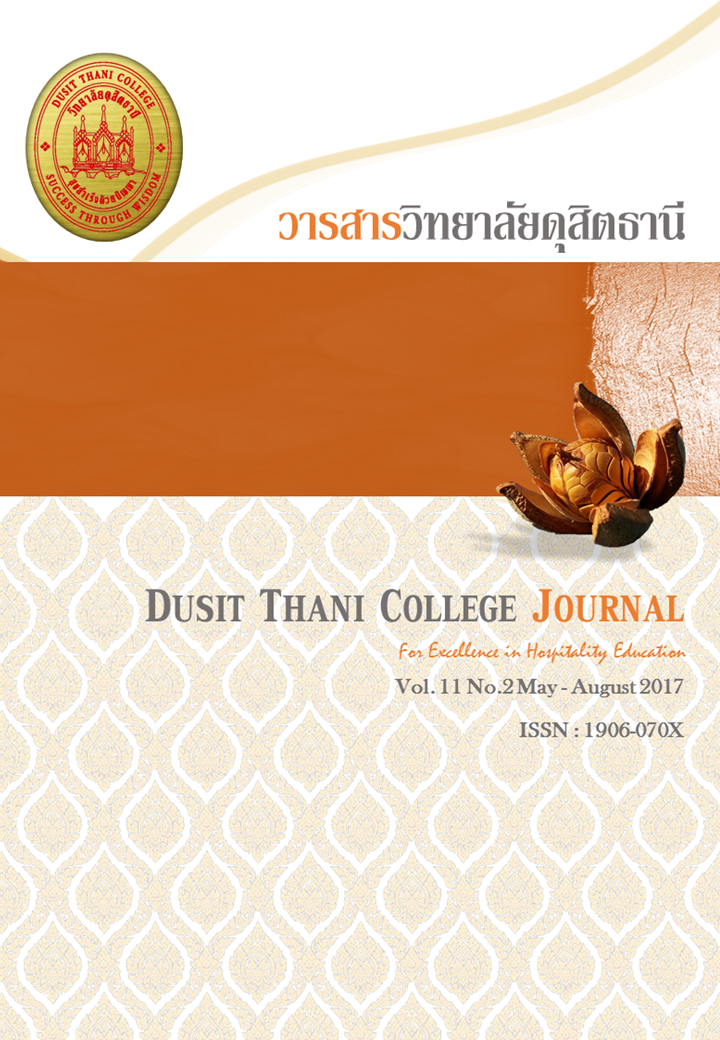Development of a Virtual World to Strengthen Necessary Skills for Employment of Vocational Students in Thailand
Main Article Content
Abstract
The Purpose of this research were to study the necessary skills of vocational education students and to develope a virtual world to strengthen necessary skills for employment of vocational students in Thailand. The sample groups consists of interviews 15 supervisors of small and medium-sized businesses, 3 specialist in second life, evaluation of 390 students register in year 2 diploma program from 8 colleges which under office of the Vocational Education Commission and an assessment 16 students register in year 2 diploma program The research instruments consisted of an assessment necessary skills, an opened-end questions for interview and a questionnaire. The data analyzed by content analysis, average and standard deviation. The results in 3 necessary skills for employment of vocational students in Thailand were communication skills (writing and speaking), creative skills and problem-solving skills. The development of learning module in second life for strengthen necessary skills for employment of vocational students in Thailand consisted of 3 units of learning with 16 hours result in pre-test and post-test of using a virtual world to strengthen necessary skills for employment of vocational students in Thailand had better skills at a .01 significance level and had a high level of satisfaction in testing a virtual world.
Article Details
Article Screening Policy
- All research and academic articles to be published must be considered and screened by three peer reviews in the relevant field / article.
- All articles, texts, illustrations and tables published in the journal are the personal opinions of the authors. Editors don't always have to agree. And no responsibility whatsoever is the sole responsibility of the author.
- The articles to be published must never be published. Where did you first publish? And not in the consideration of other journals If the audit found that there has been a duplicate publication It is the sole responsibility of the author.
- Any article that the reader sees as being plagiarized or impersonated without reference. Or mislead the work of the author Please let the journal editor know it will be your greatest blessing.
References
Economy. [online]. Available from :
https://www.bot.or.th/Thai/Monetrypolicy/ArticleAndReserch/DiscussionPaper/DP012013.pdf. [May 14, 2016]
Chana Kasiphar. (1996). Report on the demand of the Bangkok industrial group: Office of
the Council of Education.
Dede, c. (2009). Comparing Frameworks for “21st Century Skills. [online]. Available from :
https://www.watertown.k12.ma.us/dept/ed_tech/research/pdf/ChrisDede.pdf.
[2012, September 15]
Information Technology Center and Vocational Training, Office of Vocational Education
Commission (2012). Information : Analysis of provincial occupational workers in
2012. [online]. Available from : https://www.vec.go.th/Portals/0/Doc/Province2009.pdf. [January 10, 2013]
Kao Wongboonsin and Patcharawalai Wongboonsin. (1994). International competitiveness through the adjustment of middle and lower levels of labor. Journal of Demography 20 (March 1).
Thailand Development Research Institute. (2011). Final Report of Education program
The availability of human resources to support the liberalization of trade in 9
commodities under the framework of the Asean Economic Community. [online]. Available from : https://home.dsd.go.th/SDP/filedownload/PPT/ReportFinal.pdf. [September 15,2012]
The Word Bank. (2008). Thailand Investment Climate Assessment Update. [online]
Available from :https://siteresources.worldbank.org/THAILANDEXTN/Resources/333295-
1249970320257/TH_ICA_Update08_fullreport.pdf.[2012, September 15].
Vicharn Panich. (2011). Teacher to disciple : 21st Century Learning Styles for Disciples
Sotsri-Salitwong. Foundation, Doctor, Prasert Print production, Bangkok.
Whittion, N. and Moseley. (2012). A Using games to Enhance Learning and Teaching:
A Beginner’s Guide. Newyork, NY : Rutledge.
Wang, Y. and Braman, J. (2009). Extending the classroom through Second Life. Journal of
Information systems education, Vol. 20 November 2009:235-247.
Yamane, Taro. (1973). Statistics: An Introductory Analysis. Third edition. New York: Harper
and Row Publication.
Zang, J. (2007). Second Life: Hype or Reality? Higher Education in the Virtual World.
DEOracle @ UMUC An Online Learning Magazine for MUCFaculty. [online].
Available from : https://deoracle.org/online-pedagogy/emerging-technologies /second-life.html.[2012, October 31].


